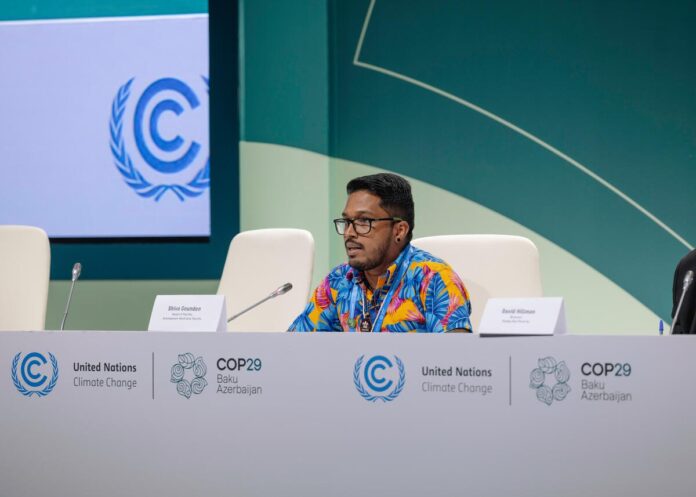BAKU, Sunday 24 November 2024 — The COP29 climate talks have concluded with disappointment, as the most climate-affected countries are frustrated by what is perceived as an insufficient financial commitment and a lack of progress on phasing out fossil fuels.
The final offer of $US300 billion by 2035 was met with disappointment by the most vulnerable nations facing the impacts of climate change. The absence of a specified minimum amount to be provided as grants or highly concessional loans, a key demand of small island states and less developed countries, coupled with the rejection of including loss and damage in the new financial goal, led to further discontent. The lack of progress on fossil fuel mitigation was also criticized.
Shiva Gounden, the Head of Pacific at Greenpeace Australia Pacific, expressed his disappointment from Baku: “This outcome is truly disheartening for the most climate-vulnerable countries, particularly Pacific nations, who have pushed for more ambitious actions on fossil fuel mitigation and essential financial support for our communities.
“The limited climate finance goal agreed upon by wealthier nations is insufficient to address the escalating climate crisis affecting millions of people globally.
“It is a deal that shifts responsibility to developing countries to cover climate impacts they did not generate.
“Despite the discouraging result, those at the forefront of the climate crisis cannot afford to lose hope. We will continue to advocate for change at COP30 in Brazil, demanding accountability from the fossil fuel industry, fair contributions from major emitters, and alignment of emissions targets with a 1.5C pathway to ensure a sustainable future for our communities.”
Dr. Susie Byers, Head of Advocacy at Greenpeace Australia Pacific, also commented from Baku: “The outcomes of the negotiations in Baku fall short of addressing the urgent issues we are facing. We must persist in our efforts.
“Climate-affected nations, especially in the Pacific, have shown remarkable resilience during these challenging talks. However, there has been a lack of leadership from developed countries.
“Australia, as a potential co-host of COP31, has a duty to present an ambitious and 1.5C aligned climate plan, transition away from fossil fuels, and prioritize renewable energy. We urge all governments to prioritize the interests of the people over those of fossil fuel lobbyists.
“We will continue to advocate for accountability from major polluters and ensure that the voices of the most impacted nations are heard at future COP conferences.”
—ENDS—
Images for media use available here
For more information or to arrange an interview, please contact Kate O’Callaghan on 0406 231 892 or [email protected]






